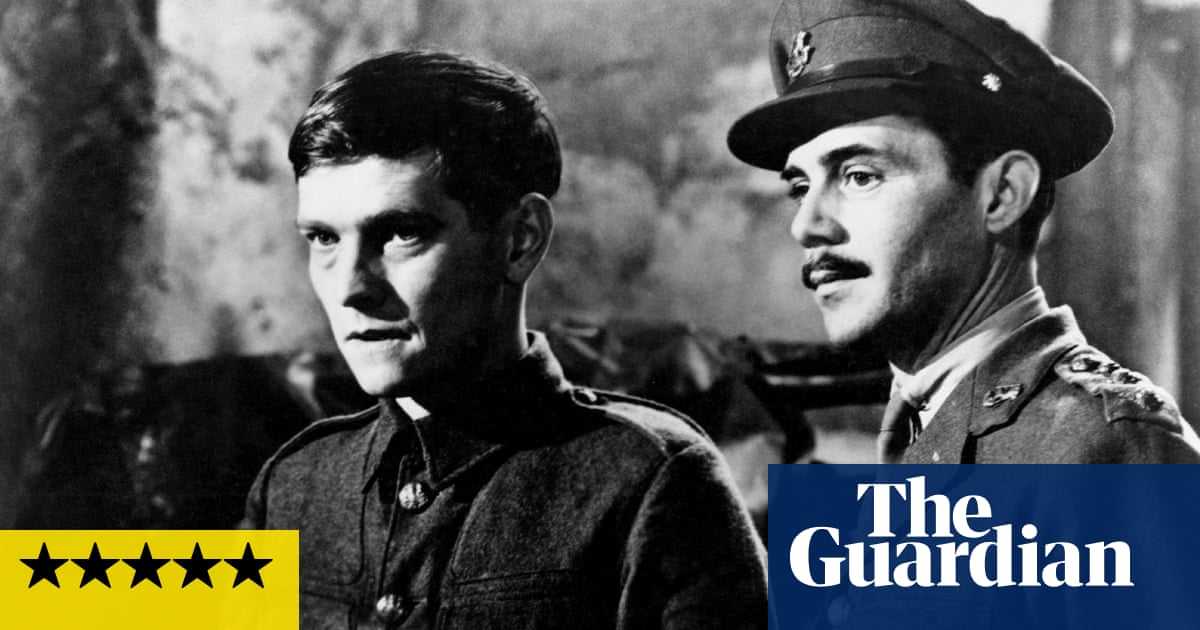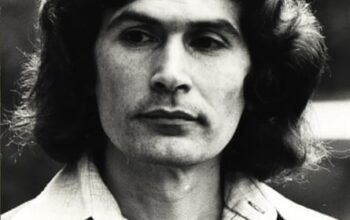
T
There is a surprising and chilling sense of present-day significance in the reissue of Joseph Losey’s intense and expressionistic film from 1964. Tom Courtenay portrays Private Hamp, a talkative yet enigmatic soldier who is accused of desertion during World War I after leaving his post at Passchendaele.
Dirk Bogarde’s suave, sorrowing Capt Charles Hargreaves is assigned the task of defending Private Hamp – suppressing his distaste for Hamp, of course, like all the officer class, and trying not to think about the inevitability of his execution – and he boldly asks the court to consider Hamp’s “mental health”. The presiding colonel, played by Peter Copley, erupts with contempt at this modern-sounding phrase. “Do you mean the prisoner is a lunatic?” The answer is of course no. The idea of struggling with your mental health has a real significance for us now, although the defendant himself is utterly unaware of the issue and is quite incapable even of attempting to capitalise on it.
Based on John Wilson’s stage-play Hamp, which was adapted from James Hodson’s novel Return to the Wood, King and Country tells a harrowing tale of wartime Britain, specifically the first world war and the class divide. The actors chosen by director Losey were representative of the social hierarchy at the time, with gentlemen and players portraying officers and other ranks. Similar to Kubrick’s 1957 film Paths of Glory, the story centers on a soldier being executed for cowardice, highlighting the senselessness and brutality of war. Bogarde plays Hargreaves, a decent and liberal character who wishes Hamp could have avoided his fate as mere “cannon fodder.” Barry Foster portrays Lieutenant Webb, a likable and friendly officer, while James Villers embodies the contemptuous prosecuting officer Captain Midgley. Despite their coldness during the trial, they act cordially in the officers’ section of the dugout, resembling an Oxbridge common room. Leo McKern’s character, Captain O’Sullivan, a blustering medical officer who only knows to prescribe laxatives for terrified soldiers, is not fully accepted into their social circle. Meanwhile, the ordinary soldiers who are tasked with executing Hamp in a few hours are getting drunk and playfully putting a rat on trial for biting one of them. (One of these soldiers is played by David Cook, an actor and novelist.)
Hamp, portrayed by Courtenay, is portrayed as a naive and oblivious character who reveals to Hargreaves that he joined the war in 1914 because of pressure from his wife and mother. He also reveals that his wife is now involved with another man. Hargreaves sees this as a potential defense strategy, but Hamp seems unfazed by it now and even his near-death experience does not seem to have affected him. Hargreaves is unsure how to interpret Hamp’s strange and childlike honesty, along with his vague recollection of his feelings and timing. Is it an act? Ignorance? Or is it what future generations would call a catch-22 situation? It is clear that Hamp is mentally unstable, but so is the entire war. Madness could be used as a justification for Hamp or even as an argument for acquittal, but it is also the main reason for continuing the war at all.
Losey presents a striking and bleak black-and-white portrayal of this theme, incorporating unsettling imagery from the trenches during wartime. He also includes subtle flashes of photographs to illustrate Hamp’s memories of civilian life and his mental state before enlisting. We catch a glimpse of Hamp’s home in Islington, London, and his young son dressed in a sentimental manner reminiscent of an Edwardian studio photograph. Additionally, a confident man with a mustache is shown, possibly the lover of Hamp’s wife. As Hamp speaks of loyalty to “king and country,” we are shown an ironic image of the Kaiser next to his cousin, King George V.
Hamp and the others are faced with an added level of terror as they know the precise time of his impending demise. While the rest of them are fully aware of their imminent death, they can still find solace in the possibility of escape. However, Hamp is unable to find this comfort, as he is acutely aware of his own mortality. This movie is a harrowing ordeal, and Dirk Bogarde’s final blow is the most horrific aspect of all.
Disregard advertisement for newsletter.
after newsletter promotion
Source: theguardian.com


